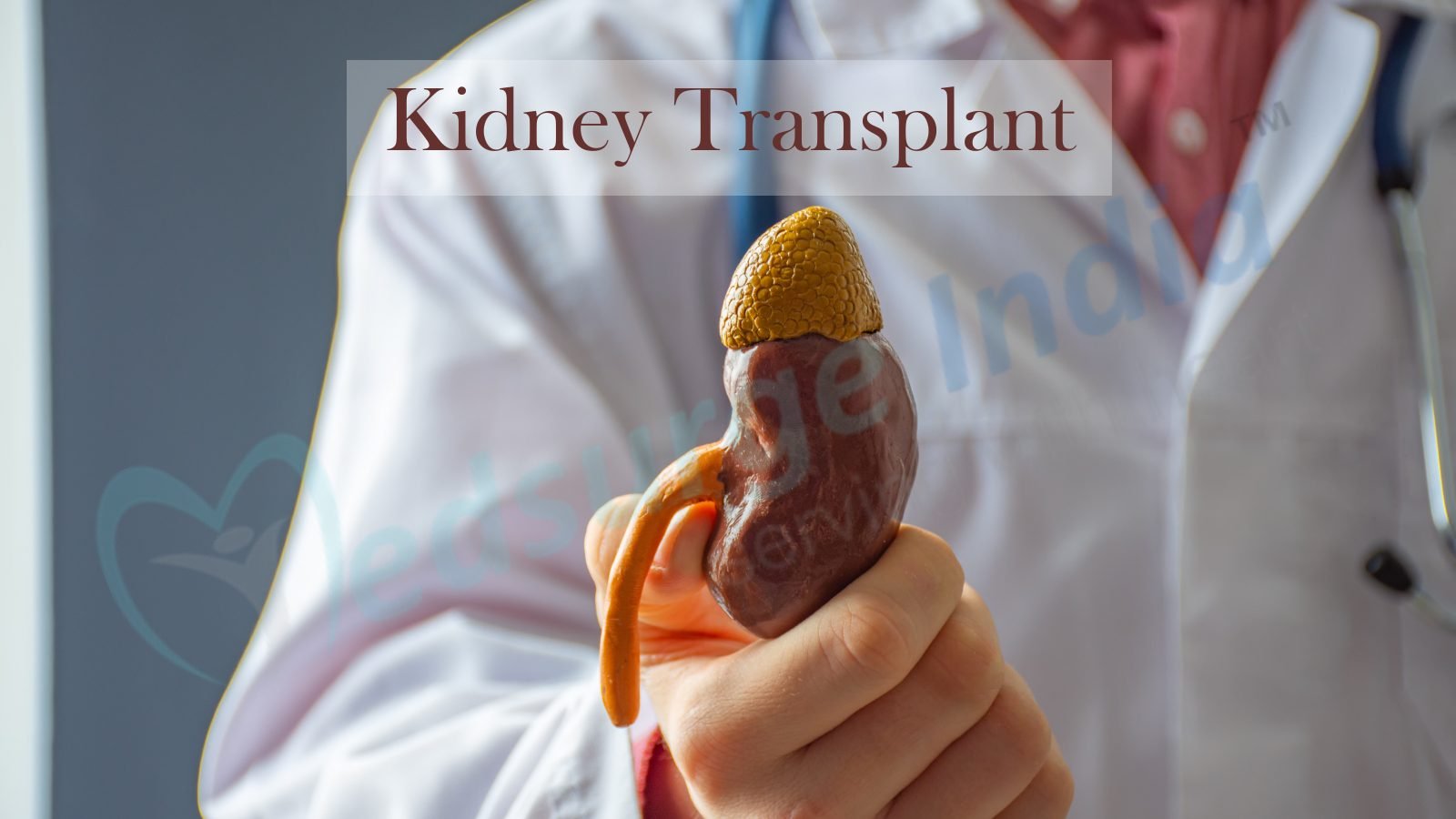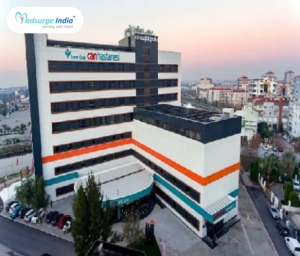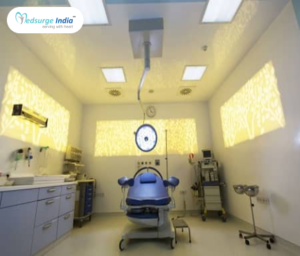Kidney Transplant Cost in Turkey
Unlock Exclusive Discount : Your Gateway to Premium Healthcare with Medsurge India Health Value Card.

Unlock Exclusive Discount : Your Gateway to Premium Healthcare with Medsurge India Health Value Card.


Each side of the spine has two bean-shaped kidneys placed right below the rib cage. The primary function of the kidneys is to filter waste, minerals, and fluid from the blood and excrete them through urine.
When the kidneys become damaged and lose their ability to filter, fluid and waste begin to build up in the body in dangerous amounts. This might cause blood pressure to rise, which can lead to kidney failure, commonly known as end-stage renal disease (ESRD). Renal failure occurs when the kidneys have lost 90% of their ability to function normally.
Chronic kidney disease can result in permanent renal damage and organ failure. If left untreated, this can lead to a variety of health issues, including death. Renal failure treatment options include kidney transplantation and dialysis. A kidney transplant, on the other hand, can be the most effective treatment for chronic renal failure in many situations.
As a result, Dialysis or a kidney transplant are indicated as treatments for patients with renal failure.
Kidney transplantation is a long-term treatment that involves the transplantation of a healthy kidney from a living or deceased donor into a patient whose kidneys have stopped working correctly (known as a recipient).
The operation is carried out by a transplant team that includes surgeons who specialize in transplant surgery, urologists, nephrologists, expert nurses, as well as social workers, and transplant coordinators.
Turkey is one of the top ten countries in the world for live donor kidney and liver transplants. The majority of transplant surgeries account for a significant portion of all kidney transplant in Turkey.
Because of its experienced medical experts and enhanced health infrastructure, Turkey is gradually becoming a prominent health tourism destination for organ transplants. Turkey has made significant investments in the health industry in order to improve service quality and increase health tourism.
The hospitals and centers for organ transplants in Turkey are well-equipped with cutting-edge technologies to deliver world-class medical care. Patients receive extensive care at the hospitals during their therapy.
In comparison to other western countries such as Europe, Asia, Africa, and the United States, Turkey has a high survival rate. Turkey has been a favored destination for medical tourists around the world due to its low treatment costs and zero waiting times due to the availability of donors.
Dialysis is an option for kidney transplantation, but it is inconvenient because the patient must go to the hospital every week for dialysis. In Turkey, there are numerous good hospitals for kidney transplantation. Anyone above the age of 18 in Turkey is eligible to donate a kidney voluntarily. And because the number of donors in Turkey is rapidly expanding, there is a very good probability that you will be able to discover a kidney that your body will not reject easily.
The Turkish Health ministry permits hospitals to accept only living donors for international patients, who are not eligible for cadaver kidney transplants.
They must provide their own donors with proof of connection, and non-relative donors are subjected to a thorough screening by the medical ethics committee.
Patients who have a living donor can have their transplants done faster and earlier because there is no need to wait for a suitable donor to become available. In Turkey, a candidate for a living donor kidney transplant must meet the following criteria:
The average Kidney Transplant cost in Turkey on average starts from USD 18,000. The treatment can vary according to different factors. Here is an estimate of prices on the treatment cost:
| Average Cost | USD 22,000 |
| Minimum Cost | USD 18,000 |
| Maximum Cost | USD 28,000 |
| Cities | Starting Prices |
| Istanbul | USD 18,500 |
| Ankara | USD 18,400 |
| Antalya | USD 18,000 |
| Izmir | USD 18,100 |
| Bursa | USD 18,000 |
| Adana | USD 18,000 |
Please note the price given above will vary depending on the treatment criteria.
The standard and excellence of medical treatment and amenities are comparable to those of the most prominent healthcare facilities in the world, even after deducting the cost of lodging, meals, and transportation. The following here are some variables that can affect Kidney Transplant Cost in Turkey:
Under the direction of the most skilled physicians, Medsurge India provides the most economical Kidney transplant cost in Turkey for patients.
Kidney Transplant in Turkey is carried out while the patient is anesthetized. The procedure can take anywhere from 2 to 4 hours. This surgery is known as a heterotypic transplant because the kidney is transplanted to a different site than where it naturally exists.
The kidney transplant surgery is carried out while the patient is anesthetized. The procedure can take anywhere from 2 to 4 hours. This surgery is known as a heterotypic transplant because the kidney is transplanted to a different site than where it naturally exists.
An intravenous line is started in the hand or arm, and catheters are inserted to the wrist and neck to check blood pressure, heart rate, and obtain blood samples during the kidney transplant surgery. Catheters can also be inserted in the pelvis or the area below the collarbone.
The hair around the surgical site is shaved or cleaned, and a urinary catheter is placed into the bladder. On the operation table, the patient is laying on their back. A tube is inserted into the lungs through the mouth after a general anesthetic has been administered. This tube connects to a ventilator, which allows the patient to breathe throughout the surgery.
The blood oxygen level, breathing, heart rate, and blood pressure are all constantly monitored by the anesthesiologist. An antiseptic solution is applied to the incision site. The doctor makes a large incision on one side of the lower abdominal area. Before implantation, the donor's kidney is visually examined.
The kidney of the donor is now implanted in the abdomen. The right donor kidney is usually transplanted on the left side, and vice versa. This opens up the possibility of connecting the ureters to the bladder. The renal artery and vein of the donor's kidney are stitched to the efferent lymphatic artery and vein.
The patient's urine bladder is subsequently linked to the donor ureter. The incision is closed with surgical staples and stitches, and a drain is placed at the incision site to avoid swelling. Finally, a sterile bandage or dressing is applied to the wound.
The success rate of kidney transplantation in Turkey began a long time ago due to the availability of highly skilled medical specialists and nursing staff.
Patients from more developed parts of the world travel to Turkey for low-cost, high-quality medical care.
According to hospital statistics, the living donor transplant has a success rate of about 80%, and the patient reports no discomfort or displeasure.
A: Many criteria influence whether or not you will be offered an organ, including your blood type, the length of time you have had renal failure, medical urgency, where you reside (an organ must be safely delivered the distance to the transplant facility), and in some cases, your weight and size.
A: In Turkey, people must be 18 years old or older to donate a kidney. The donor must be a family member, relative, or friend of the receiver. The donor must be in good health and free of diabetes, active infections, cancer of any type, kidney disease, and other organ failures.
A: It takes roughly four hours to complete the procedure. You'll be sore at first, but you'll be out of bed in a day or two and back at home in a week. If the kidney was donated by a living person, it should start working right away. It can take two to four weeks or more for a kidney from a deceased donor to start working.
A: Sign as follows :-
A: If your new kidney doesn't start operating right away, you'll require dialysis to remove wastes, excess salt, and fluid from your body until it does. Rejection of a transplant is uncommon shortly after surgery and can take days or weeks to manifest.

Liver Transplant Surgeon
Consultant
24 years of experience
LIV Hospital, Istanbul
View Doctor









By using our site, you agree to our Terms and Conditions, Privacy Policy and Refund Policy. Medsurge India provides reliable healthcare information and treatment options to support informed decision-making. Our content is designed to support and complement the guidance of your treating doctor, helping you feel informed and confident throughout your healthcare journey. We also Accept International Payments.

Copyright © 2025 NSM ONLINE SOLUTIONS PRIVATE LIMITED. All rights reserved.